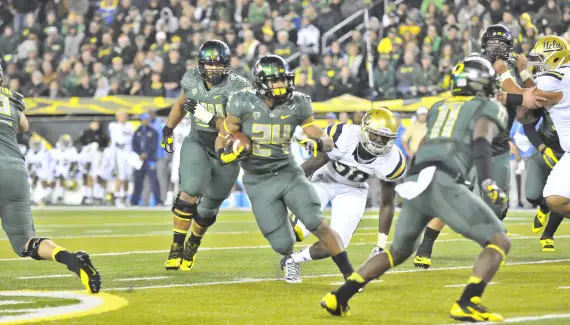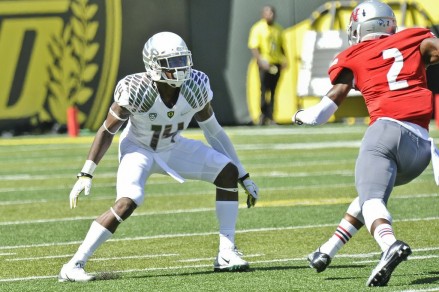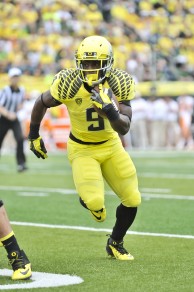Kevin Cline
If you ever have the opportunity to watch a big Ducks game in a backwoods South Carolina bar on $1 beer night, I highly recommend doing so. Unless you’re wearing an Oregon jersey and the team happens to get beaten like a rented mule. In that kind of situation, you’d probably meet this guy named Mo (or as he calls himself, “Mo’ Money”), who obnoxiously points to the TV and looks at you, laughing every time the Ducks make a mistake. Needless to say, this loss was painful.
Sitting there watching Mo and his collection of women, who may or may not have had questionable employment histories, was a night to remember for all the wrong reasons; it hurt. The loss may have crippled the team’s championship dreams, might have crushed Marcus Mariota’s Heisman hopes and was definitely painful for the fan base. But did it hurt recruiting? The answer is unlikely, probably and maybe. Let’s break it down.
It’s well known in the recruiting community that losses matter a lot more to fans than they do to recruits. Now, if the losses start adding up, that’s one thing, but generally, a single loss is almost never credited with keeping a recruit from committing and signing his LOI. That said, Oregon’s loss to Stanford, and the way they lost, has some unique implications.
The national perception of Oregon football is all too familiar to Ducks fans. The consensus seems to be that the Ducks are an exciting team that’s fun to watch, but ultimately, they can’t hang with “power” football teams; last Thursday night only strengthened that view.
Evaluating whether or not this perception is fair, that’s another article for another day. The bottom line is that Oregon’s loss to Stanford gave more ammo to those looking to discount the team’s recent success. That includes fans, analysts and even coaches all around the country, deploying their go-to negative recruiting tactics when head-to-head with the Ducks.
What are they selling? Well, that Oregon is a “system” school that won’t adequately prepare players for the NFL, as evidenced by their losses to power run teams with physical defenses. The logic and irony of that argument aside, it’s amazing how many recruits you’ll hear mention it as a concern.
Near term, it’s unlikely the Ducks will see a noticeable negative impact. Recruits who were leaning Oregon probably aren’t changing their minds because of one loss to a very good Stanford team, and if they are having second thoughts, the fit might have never been ideal anyway.
Long term, however, might be a different story. Had Oregon beaten the Cardinal, they would have had an inside track to the national championship game. At that point, anything could have happened, but had Oregon beaten another powerhouse to win their first national title, the national perception would have quickly begun changing.
‘Perception is reality’ often holds true in recruiting. Many have flocked to Oregon because of their perceived speed and sexiness. In the same vein, many have been turned away by the lack of an “NFL scheme” and have opted for programs they feel will better prepare them for the next level. Had Oregon been able to beat Stanford, and then Alabama in the national championship, it’s hard not to believe that a couple of big-time recruits would have noticed; guys who might not have otherwise paid attention. To say, “we don’t want those guys anyway” is a bit disingenuous; if a top-5 defensive tackle or linebacker wants to be a Duck, the coaches likely aren’t turning him away.
Even if only one player ended up committing to Oregon because of that hypothetical shift in national perception described above, that still matters. Thus, to say the loss didn’t impact recruiting in any way would be wrong. What kind of significance it truly had will never be known. Luckily for Oregon, they still have plenty of opportunities to impress. In fact, they’ll be hosting a couple of highly-sought after recruits in Autzen this Saturday.
Related Articles:
Chip Kelly Update: Everything's Good Again ...
Chip Kelly Update: Wailing and Gnashing of Teeth
Shock and Awe -- The Oregon Ducks' Football Hangover Effect
Despite Lopsided Score, Georgia State "Never Stopped Believing"
Hope Springs Eternal for Ducks
Incompetent Pac-12 Officials: How Do You Miss ALL of THIS?
Chris was born in Montevideo, Uruguay, but made his way to Oregon by the age of five, when he attended his first game at Autzen Stadium. A huge sports fan at a young age, Chris grew up playing football, basketball and golf. Although realizing he isn’t likely to play in the NFL or NBA, Chris still holds on to hopes of being a professional golfer should his unfortunate putting woes take a turn for the better. A bit of a platypus, he attended both Oregon State and Oregon during his collegiate days where he earned a business degree in Finance and Business Administration. Chris works for Daimler Trucks North America in Portland, and plans to get his MBA from the University of Oregon.
Chris has been an active member in the recruiting community since 2005. He studies the intricacies of recruiting and is particularly intrigued by talent evaluation techniques. He is currently working on developing his own scouting reports for every scholarship player on the UO roster. Chris lives with his wife, Katrina, and his two-year-old son Lucas (a future dual-threat QB).




